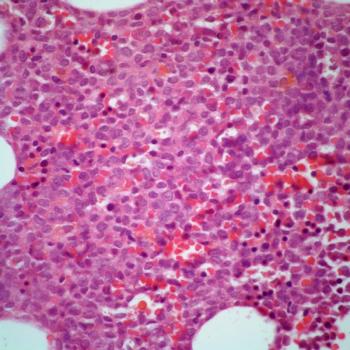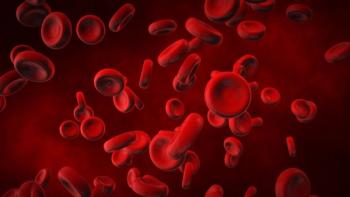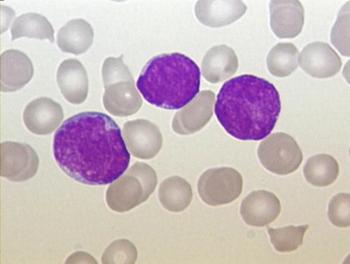
The experimental agent appears tolerable in patients with newly diagnosed FLT3-mutated acute myeloid leukemia in a phase 1b trial.

Your AI-Trained Oncology Knowledge Connection!


The experimental agent appears tolerable in patients with newly diagnosed FLT3-mutated acute myeloid leukemia in a phase 1b trial.

Current research in the sarcoma space includes the development of treatment options such as T-cell therapies, and combinations such as TKIs/immunotherapy, according to Brian Van Tine, MD, PhD.

The first and only dual action tablet, niraparib and abiraterone acetate, is now available for use in patients with BRCA-positive, metastatic castration-resistant prostate cancer following its approval by the FDA.

Findings from a retrospective analysis suggest an association between bridging therapy and poorer outcomes among patients with aggressive, relapsed/refractory B-cell non-Hodgkin lymphoma.

Data from a phase 2 trial support a supplemental new drug application for isavuconazonium sulfate as a treatment for pediatric patients with invasive aspergillosis or invasive mucormycosis.

Findings from the CROSS-FIRE study may inform individualized decision-making regarding stereotactic radiosurgery for patients with small cell lung cancer, according to Chad Rusthoven, MD.

Amid the recent cisplatin shortages across the United States, a pharmacy expert discusses how the treatment of bladder cancer has been affected, especially in the muscle-invasive subtype.

Implementation of a personalized, proactive care pathway for breast cancer survivors will be evaluated in future clinical trials, according to one of the authors of a pilot implementation study.

The FDA requires data from an additional clinical trial to support the potential approval of avasopasem for managing radiation-induced severe oral mucositis in patients with head and neck cancer.

Patients with relapsed/refractory multiple myeloma may now receive talquetamab following the agent’s accelerated approval by the FDA.

Patients with metastatic RET fusion-positive non–small cell lung cancer may now be treated with pralsetinib, which has been granted regular approval by the FDA.

Continuing multidisciplinary discussions during the chemotherapy shortage is important for delivering the best possible care for each patient with breast cancer, according to Maryam Lustberg, MD, MPH.

Data from the phase 2 FIRE-4.5 trial suggest that cetuximab further reinforces a bevacizumab-based chemotherapy regimen as the frontline treatment of choice for BRAF-mutant, metastatic colorectal cancer.

The safety profile of selpercatinib in patients with RET fusion–positive non–small cell lung cancer in the phase 3 LIBRETTO-431 study is comparable with previous reports.

Interim data reveal favorable responses in patients with low-grade serous ovarian cancer treated with avutometinib plus defactinib, according to Susana N. Banerjee, MD.

Brian Slomovitz, MD, MS, FACOG, notes that sometimes there is a need to substitute cisplatin for carboplatin, and vice versa, to best manage gynecologic cancers during the chemotherapy shortage.

The safety profile of upifitamab rilsodotin in the phase 1b/2 UPLIFT trial is consistent with prior reports of the agent in those with platinum-resistant ovarian cancer.

The therascreen PDGFRA RGQ PCR kit has become the first FDA-approved companion diagnostic designed to detect platelet-derived growth factor receptor alpha gene mutations.

Michael Ganio, PharmD, MS, BCPS, FASHP, addresses some challenges concerning the ongoing chemotherapy shortage in the United States, and how communication among clinical teams may mitigate it.

Using the 31-gene expression profile assay may help lead to more personalized treatment strategies in patients with cutaneous melanoma, according to Aaron Farberg, MD.

Investigators plan to launch a controlled trial assessing remestemcel-L in the highest-risk adults with steroid-refractory acute graft-versus-host-disease to meet the FDA’s request for additional data.

Findings from a phase 1 trial highlight the potential tolerability and efficacy of ABM-1310 as a treatment for patients with BRAF-mutated solid tumors.

Experts from Mayo Clinic and The University of Texas MD Anderson Cancer Center discuss results from multiple myeloma trials presented at the 2023 American Society of Clinical Oncology Annual Meeting and how they may apply to clinical practice.

While there is a cisplatin shortage in the United States, the FDA has approved the importation of select chemotherapy drugs from China to help mitigate the scarcity of the agents.

Combined with chemotherapy, blinatumomab appears tolerable and beneficial in a subgroup of pediatric patients with B-cell acute lymphoblastic leukemia in first relapse but does not yield better survival outcomes in the overall population.

Patients at high risk for breast cancer appear to have higher rates of nonadherence to screening guidelines vs those at average risk.

Brian Van Tine, MD, PhD, states that sitravatinib appears to be active and well tolerated among patients with dedifferentiated or well-differentiated liposarcoma.

Kirollos Hanna, PharmD, BCPS, BCOP, FACCC, discusses what strategies are being used to treat patients with bladder cancer during the chemotherapy shortage.

The reduction of hematologic adverse effects with trilaciclib may improve clinical outcomes in patients with extensive-stage small cell lung cancer, according to Jerome Goldschmidt, MD.

Findings from a previous phase 1/2a trial demonstrate that zipalertinib is a potential treatment option for pretreated patients with non–small cell lung cancer harboring EGFR exon 20 insertion mutations.